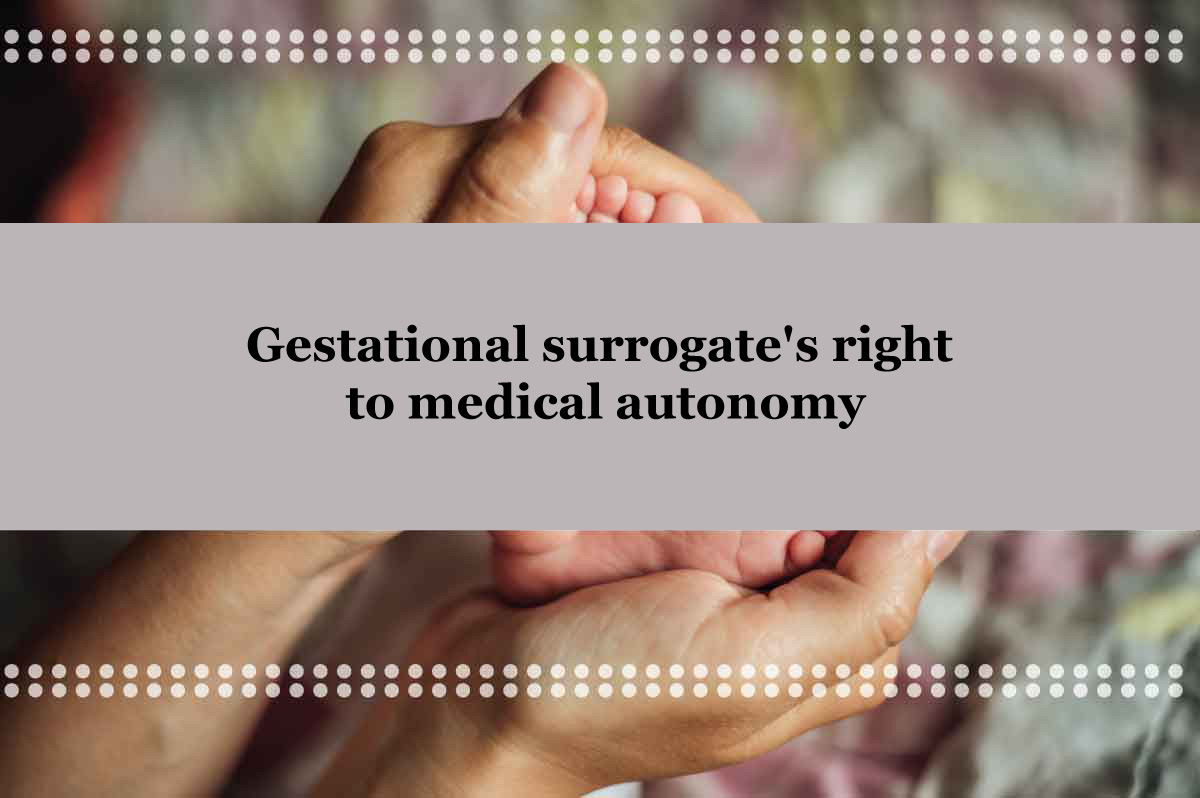How to Preserve the Gestational surrogate’s right to medical autonomy?
The role and significance of the surrogate mother in the surrogacy process are evident to everyone. Yet, when it comes to her right to the surrogate’s medical autonomy and related aspects, intended parents often get into a bit of scepticism.
Protecting the gestational surrogate’s right to medical autonomy could be a vital perspective of the surrogacy procedure that further covers every other core element. This blog investigates this debate, highlighting the significance of medical autonomy for gestational surrogates and giving real-time illustrations to demonstrate its importance. Still, before getting ahead regarding this discussion, one needs to first understand what medical autonomy is.
What do we understand by medical autonomy in Gestational Surrogacy?
Medical autonomy, within the setting of gestational surrogacy, refers to the surrogate’s right to make free decisions regarding her well-being and the pregnancy. Also, this may include choices regarding pre-birth care, the delivery process, and any medical procedures that will be vital. Also, in surrogacy programs, guaranteeing the surrogate’s medical autonomy is basic, because it maintains her principal rights as an individual.
That said, the legal systems encompassing surrogacy change drastically around the world, with a few regions advertising more assurance for surrogates than others. For instance, in California, USA, surrogacy agreements are legally authoritative, and the state recognizes the right to the surrogate’s medical autonomy. In any case, in other places, like a few European nations, surrogacy is intensely limited or by and large prohibited, regularly clearing out surrogates in a legally complicated zone.
What are certain challenges to Medical autonomy?
One of the primary challenges to a surrogate’s medical autonomy arises from the legally binding nature of surrogacy. That said, intended parents may look for to impact medical choices, either specifically or in a roundabout way, to guarantee the most excellent results for the infant. Be that as it may, this will in some cases struggle with the surrogate’s wellbeing or individual convictions. For example, intended parents may have preferences regarding cesarean sections versus natural birth, or they might contradict certain medical intercessions that a surrogate might require for her well-being.
Real-Time Cases Highlighting the Significance of Surrogate’s Medical Autonomy
Case of Melissa Cook: In a high-profile case within the United States, Melissa Cook, a surrogate for triplets, was constrained by the Intended father to experience selective reduction, a strategy to diminish the number of embryos. Cook’s refusal led to a legal fight, underlining the complexities encompassing surrogacy agreements and the surrogate’s autonomy over her body.
This case triggered the authorities to bring strict laws and regulations to curb the onset of such cases in the future. Moreover, the surrogate was provided with more powers and rights for her role in the surrogacy journey.
The Indian Surrogacy domain: Before the legal changes in 2018, India was a hub for commercial surrogacy, drawing in couples from around the world. Moreover, random reports related to surrogates being confined to cheap lodges and having restricted control over their medical care raised critical concerns about their independence and rights.
European Viewpoints: Contrary to commercial surrogacy, nations like the United Kingdom work solely for the altruistic model of surrogacy. Also, the case of surrogates within the UK regularly emphasizes the respect for the surrogate’s independence but highlights the complexity of exploring this autonomy inside the bounds of a non-commercial, altruistic Agreement.
How to keep a balance between the contractual agreement and the medical autonomy?

On the other side, counselling and support frameworks play a pivotal part in guaranteeing the surrogate’s independence is respected. Mental support can further help the surrogates explore the emotional complexities of carrying a child for somebody else, whereas legal counselling can guarantee they understand their rights and commitments.
Besides, the role of the surrogacy agency is very important here. As the agency helps the intended parents in finding a suitable surrogate mother, they must clarify in advance the needs and expectations of the intended parents beforehand.
How to manage the ethical considerations within the surrogacy agreements?
Ethical considerations in surrogacy programs regularly spin around the surrogate’s autonomy. Moreover, it is basic that surrogates are not only seen as vessels for childbirth but as people with rights and independence. Also, ethical surrogacy practices ought to prioritize the well-being and health of the surrogate, along with the urge of the intended parents to have their own biological child.
That said, the future of surrogacy will likely see a proceeded emphasis on securing the surrogate’s medical independence. This could include more standardized legal systems over distinctive locales and an expanded focus on ethical practices inside the surrogacy industry.
At the same time, connecting with a reputed surrogacy agency or clinic is equally important. While most of the intended parents look forward to an affordable surrogacy program, they often write off the importance of the quality of the services.
So, as we discussed the medical autonomy of the surrogate mothers, we must also talk about the ways to facilitate that. First up, the surrogate mother can mention her expectations to the medical counsellor from the surrogacy agency. On the other hand, the onus should be to locate an agency that takes care of the rights and interests of every party included.
Final words
Protecting the gestational surrogate’s right to medical autonomy isn’t just a legal requirement. Instead, it’s related to the ethics of a surrogacy program. Besides, real-time cases from around the world highlight the complexities and the need to ensure these rights. Also, as surrogacy proceeds to be a practical alternative for many intended parents, it is basic that the industry advances to guarantee that the rights and independence of surrogates are a priority at every end. Moreover, by prioritizing the health, well-being, and independence of surrogates, we are able to guarantee that surrogacy remains a commonly useful and ethically fair practice for everyone.



